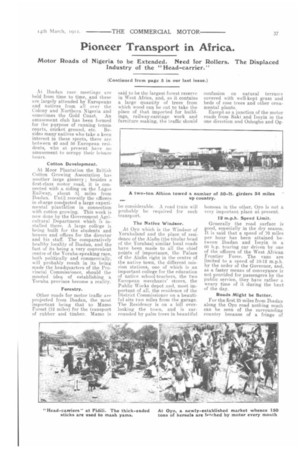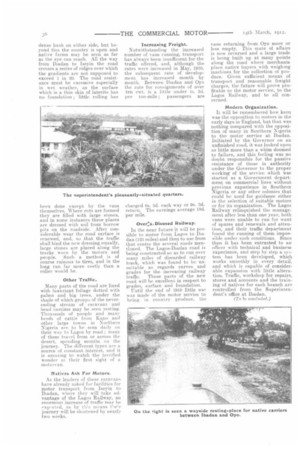Pioneer Transport in Africa.
Page 17

Page 18

If you've noticed an error in this article please click here to report it so we can fix it.
Motor Roads of Nigeria to be Extended. Need for Rollers. The Displaced Industry of the "Head-carrier.'
(Continued from page 5 in our last issue.) At lbadan race meetings are held from time to time, and these are largely attended by Europeans and natives from all over the Colony and Northern Nigeria and sometimes the Gold Coast. An amusement club has been formed for the purpose of running tennis
courts, cricket ground, etc. Besides many natives who take a keen interest in these sports, there are between 40 and 50 European residents, who at present. have no amusement to occupy their leisure hours.
Cotton Development.
At Moor Plantation the British Cotton Growing Association has another large ginnery ; besides a first-class motor road, it is connected with a siding on the Lagos Railway, about 4 miles from Ibadan. Until recently the officers in charge conducted a large experimental plantation in connection with cotton growing. This work is now done by the Government Agricultural Department which is installed there. A large college is being built for the students and houses and offices far the director and his staff. The comparatively healthy locality of Ibadan, and the fact. of its being a very convenient. centre of the Yoruba-speaking race, both politically and commercially. will probably result in its being made the headquarters of the Provincial Commissioner, should the mooted idea of establishing. a Yoruba province become a reality.
Forestry.
Other roads for motor traffic are projected from Ibadan, the most important being that to Mame Forest (12 miles) for the transport of rubber and timber. Nfamo is said to be the largest forest reserve in West Africa, and, as it contains a large quantity of trees from which woad can be cut to take the place of that imported for buildings, railway-carriage work and furniture making, the traffic should be considerable. A road train will probably be required for such transport.
The Native Windsor.
At Oy-o which is the Windsor of Yorubaland and the place of residence of the Alafin (the titular head of the Yoruba,$) similar local roads have been made to all the chief points of importance, the Palace of the Alafin right in the centre of the native town, the different mission stations, one of which is an important college for the education of native school-teachers, the two European merchants' stores, the Public Works depot and, most important of all, the residence of the District Commissioner on a beautiful site two miles from the garage. The Residency is on a hill overlooking the town, and is surrounded by palm trees in beautiful
confusion on natural terraces covered with well-kept grass and beds of rose trees and other ornamental plants.
Except as a junction of the motor roads from Saki and Iseyin in the one direction and Oshogbo and Og bomosa in the other, Oyo is not a very important place at present.
12 m.p.h. Speed Limit.
Generally the road surface is good, especially in the dry season. It is said that a speed of 70 miles per hour has been attained between Ibadan and Iseyin in a GO h.p. touring car driven by one of the officers of the West African Frontier Force. The vans are limited to a speed of 10-12 m_p.h. by the order of the Governor, and, a.s a faster means of conveyance is not provided for passengers by the public service, they have rather a weary time of it during the heat of the day.
Roads Might be Better.
For the first 25 miles from Ibadan along the Oyo road nothing much can be seen of the surrounding country because of a fringe of dense bush on either side, but beyond this the country is open and native farms may be seen as far as the eye can reach. All the way from Ibadan to Iseyin the road crosses a series of ridges over which the gradients are not supposed to exceed 1 in 20. The road resistance must be excessive especially in wet weather,as the surface which is a. thin skin of laterite has no foundation ; little rolling has been done except by the vans themselves. Where ruts are formed they are filled with large stones, and in some instances these places are dressed with soil from borrow pits on the roadside. After considerable wear the road surface is renewed, and, so that the traffic shall bind the new dressing equally, large stones are placed along the tracks worn by the motors and people. Such a method is of course ruinous to tires, and in the long run far more costly than a roller would be.
Other Traffic.
Many parts of the road are lined with luxuriant foliage dotted with palms and big trees, under the shade of which groups of the neverending stream of caravans and head carriers may be seen resting. Thousands of people and many herds of cattle from Kano and other large towns in Northern Nigeria. are to he seen daily on their way to Lagos by road ; many of them travel from or across the desert, spending months on the journey. The different types are a source of constant interest, and it is amusing to watch the terrified wonder at their first sight. of a motorvan.
Natives Ask For Motors.
As the leaders of these caravans have already asked for facilities for motor transport from Iseyin to Ibadan, where they will take advantage of the Lagos Railway, an enormous increase of traffic may be sxpseted, as by ths means ttleir journey will be shortened by nearly two weeks. Notwithstanding the increased number of vans running, transport has always been insufficient for the traffic offered, and, although the rates were increased in May, 1910, the subsequent rate of development has increased month by month. Between Ibadan and Oyo the rate for consignments of over ten cwt. is a little under Is. 3d. per ton-mile ; passengers are
charged Gs. 3d. each way or 9s. 3d. return. The earnings average 18d. per mile.
Over:a Disused Railway.
In the near future it will be possible to motor from Lagos to lbadan (123 miles) and then to use from that centre the several roads mentioned. The Lagos-Ibadan road is being constructed so as to run over many miles of discarded railway track, which was found to be unsuitable as regards curves and grades for the increasing railway
traffic. These parts of the new road will be excellent in respect to grades, surface and foundation. Until the end of 1910 little use was made of the motor service to bring in country produce, the
vans returning from Oyo more or less empty. This state of affairs is now reversed and a large trade is being built up at many points along the road where merchants place native buyers with weighing machines for the collection of produce. Given sufficient means of transport and reasonable freight charges, the future will prove profitable to the motor service, to the Lagos Railway, and to all concerned.
Modern Organization.
It will be remembered how keen was the opposition to motors in the early days in England, but that was nothing compared with the Nigeria
of many in Southern to the motor service at Ibadan. Initiated by the Governor on an unfinished road, it was looked upon as little more than a whim doomed to failure, and this feeling was no doubt responsible for the passive resistance of those in authority under the Governor to the proper working of the service which was started as a Government department on commercial lines without previous experience in Southern Nigeria or any other colonies that could be used for guidance either in the .selection of suitable motors or for its organization. The Lagos Railway relinquished the management after less than one year, both vans were unable to run for want of spares and renewals and attention, and their traffic department found the running of them impossible under such conditions. Since then it h-as been entrusted to anofficer. with technical and business experience, and step by step a system has been developed, which works smoothly in every detail, and which is capable of considerable expansion with little alteration. Traffic, workshop for repairs, stores and accounts and the training of natives for each branch are controlled from the Superintendent's office at Ibadan.
























